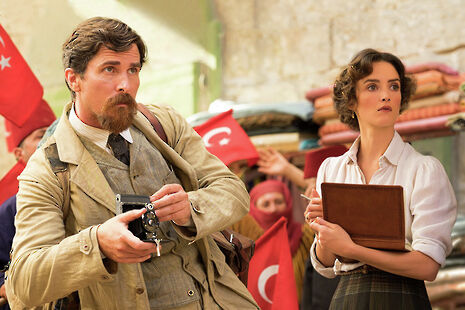Review: ‘The Promise’ of representation
Perdi Higgs reviews this new historical drama with critical and personal expertise, highlighting the importance of cinema in representing the past.

The story of the Armenians has long been hidden away within modern history. Outside the world of the Kardashians, there is little known about this small country nestled between Turkey and Azerbaijan. But this nation has an incredible story to tell.
The release of The Promise stands as a groundbreaking moment for Armenians. For the first time, their story is being told in the mainstream media. As an historical drama, The Promise tells the story of the final years of the Ottoman Empire, and the Armenian Genocide that resulted in the murder of 1.5 Armenian people. It was a systematic, targeted destruction of a nation – yet people rarely seem to know very much about it. It is my family’s story.
“The danger behind ‘forgetting’ is insidious but undoubtedly sinister.”
My great-grandfather was a teenager during the persecution of Armenians under the Turks. He was captured by soldiers and separated from his family, most of whom he never saw again. He was then sent to work as a slave for a wealthy Turkish family where he remained until his escape. He was one of the fortunate ones. A large portion of the male population was exterminated or forced into labour camps. Women, children and the elderly were sent on so-called ‘death marches’ into the Syrian Desert.
This is the story told in Terry George’s The Promise that records the persecution of Armenians under the Ottomans. Released to coincide with the anniversary of the Genocide, the film does not simply tell a story: it makes a statement. This was the truth. This happened.
As a big-budget Hollywood film, The Promise inevitably mixes its history with a romantic plot: a Titanic-esque love triangle, passion amongst chaos and disaster. However, this aspect ultimately gets lost behind the bigger picture. The film does not spare any of the horrific details: the public executions, the slaughter of women and children. The film has been praised for its historical accuracy, a fact which is of great importance. To this very day, Turkey has yet to admit to carrying out the Genocide. As a result, Armenians across the world still struggle to accept their difficult history, without the closure that acceptance would provide.
The Promise makes clear that the persecution of the Armenians was not simply part of a war, but a deliberate destruction of a race. The harrowing stories are told by those who lived through it. My great-grandfather himself was a survivor, escaping from captivity in the middle of the night, finding his brother waiting for him on the border. His story is part of an incredible history previously unacknowledged.
When asked what they thought of the film, my grandparents said two things. One: that the accents were slightly too strong, and two: that they wish their parents had been alive to see it. A Hollywood film is ultimately more validation for their experience than the Armenians have ever received.
As a result of the Genocide, the Armenians are part of a diaspora. My grandparents form part of a vibrant community of Armenians who moved to London, and regularly meet up to gossip over plates of Kibbeh and Byoerk. In Los Angeles, there is an entire part of town called ‘Little Armenia’.
So whilst Armenians remain a resilient and close-knit community, their history has been somewhat pushed under the rug. The unfairness of this is obvious. But the danger behind ‘forgetting’ is insidious but undoubtedly sinister. Hitler, speaking in 1939 once made the harrowing statement: “Who, after all, speaks today of the annihilation of the Armenians?”
On a personal level, this representation provides my grandparents with a sense of acknowledgement they have always been denied. Furthermore, it reminds us of the importance of compassion. The film also recalls the vital importance of Turkish allies, those who risked their lives to protect Armenians. Finally, it reminds us to respect the past; to acknowledge history and take responsibility for it. Armenia deserves to have its voice heard.
I shall conclude with the words of my great-grandfather, Yervant Shekerdemian: “I do not seek money. I do not seek anger or hatred against the Turks. I seek peace. But what I do want is recognition – they are guilty of genocide – and I want them to recognise that. Turkey must recognise what they did to us and our dead. We must have our dignity.”
 News / CUP announces funding scheme for under-represented academics19 December 2025
News / CUP announces funding scheme for under-represented academics19 December 2025 News / SU reluctantly registers controversial women’s soc18 December 2025
News / SU reluctantly registers controversial women’s soc18 December 2025 News / Cambridge welcomes UK rejoining the Erasmus scheme20 December 2025
News / Cambridge welcomes UK rejoining the Erasmus scheme20 December 2025 Features / Should I stay or should I go? Cambridge students and alumni reflect on how their memories stay with them15 December 2025
Features / Should I stay or should I go? Cambridge students and alumni reflect on how their memories stay with them15 December 2025 Film & TV / Timothée Chalamet and the era-fication of film marketing21 December 2025
Film & TV / Timothée Chalamet and the era-fication of film marketing21 December 2025









